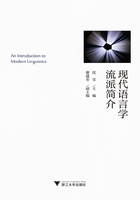
1.3 Notion of Linguistics
Linguistics is defined as the scientific study of language. As an academic discipline, the development of this subject has been recent and rapid, having become particularly widely known and taught in the 1960s. This reflects partly an increased popular and specialist interest in the study of language and communication in relation to human beliefs and behavior and the realization of the need for a separate discipline to deal with the range and complexity of linguistic phenomena; partly the impact of the subject's own internal development at this time, arising largely out of the work of Chomsky whose powerful theoretical claims gave linguistics an unprecedented scope and applicability.
When we say the scientific study of language, we can ask how “scientific” is scientific?There are often four principles to follow in order to be scientific.
1) Objectivity: An objective account is one which attempts to capture the nature of the object studied in a way that does not depend on any features of the particular person who studies it. An objective account is, in this sense, impartial, one which could ideally be accepted by any person, because it does not draw on any assumptions, prejudices, or values of particular subjects. This feature of objectivity means that disputes can be contained to the object studied. Some people regard science as objective in this sense and this objectivity is often accompanied by scientific measurement that can be tested independent from the individual scientist who proposes them. This gives it testability and reproducibility. Then the results of measurement must be communicated from person to person, and also demonstrated for third parties, as an advance in understanding of the objective world. Such knowledge confers powers of prediction or technical construction. However, this traditional view about objectivity ignores several things. First, the selection of the object to measure is typically a subjective decision and it often involves reductionism. Second, more problematic is the selection of instruments and methodology. Some features of the object under study will be ignored in the measurement process and the limitations of the chosen instruments will cause data to be left out of consideration. In addition to these absolute limits of objectivity surrounding the measurement process, any given community of researchers often shares certain “subjective views” and this subjectivity is therefore built into the conceptual systems;and it can even be built into the design of the tools used for measurement. Total objectivity is arguably not even possible in some—or maybe all—situations. (All data are theory-laden.)
2) Exhaustiveness: A good account should be based on a thorough-going observation of the facts it intends to explain. That is, all the related cases or categories under study are adequately covered and treated. The difficulty lies in the clear-cut definition of forms or categories as well as in the big enough amount of data observed. The computer can help in the latter now.
3) Consistency: A consistent account of something is one that contains no self-contradiction; that is, the later statements should not go against the earlier statements and one's theoretical claims should cohere with one another. The definition of essential technical terms must consistent, for instance. The theoretic stance must remain the same throughout.
4) Simplicity or economy: It means that other things being equal, the shorter the statement the better. If two descriptions or explanations serve the same function, the simpler one is preferred. A long list of items does not help much. The level of abstraction is important. Good generalizations are required. They contain insight and make things much simpler.